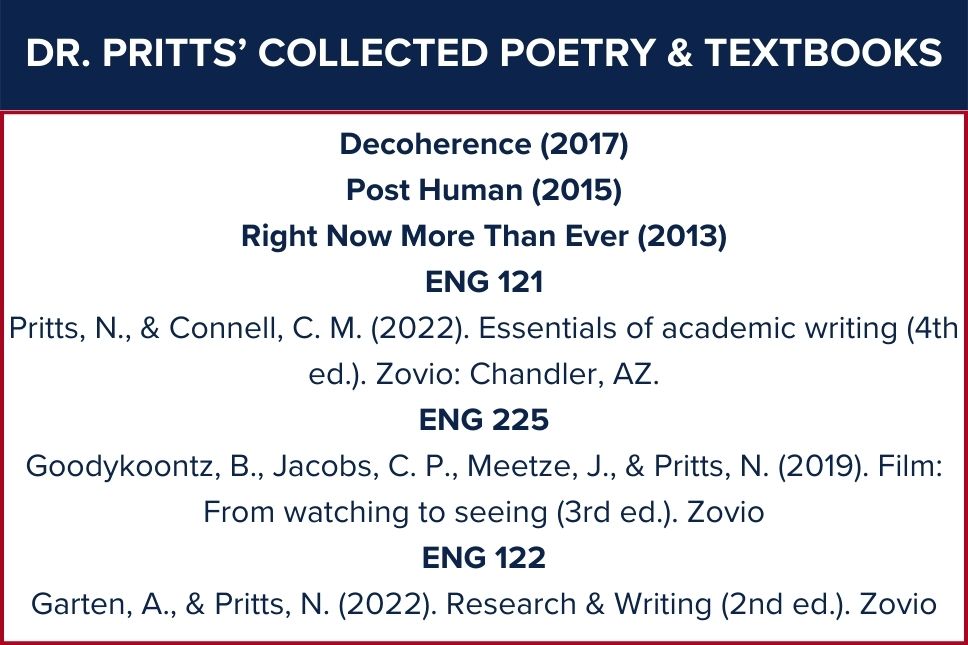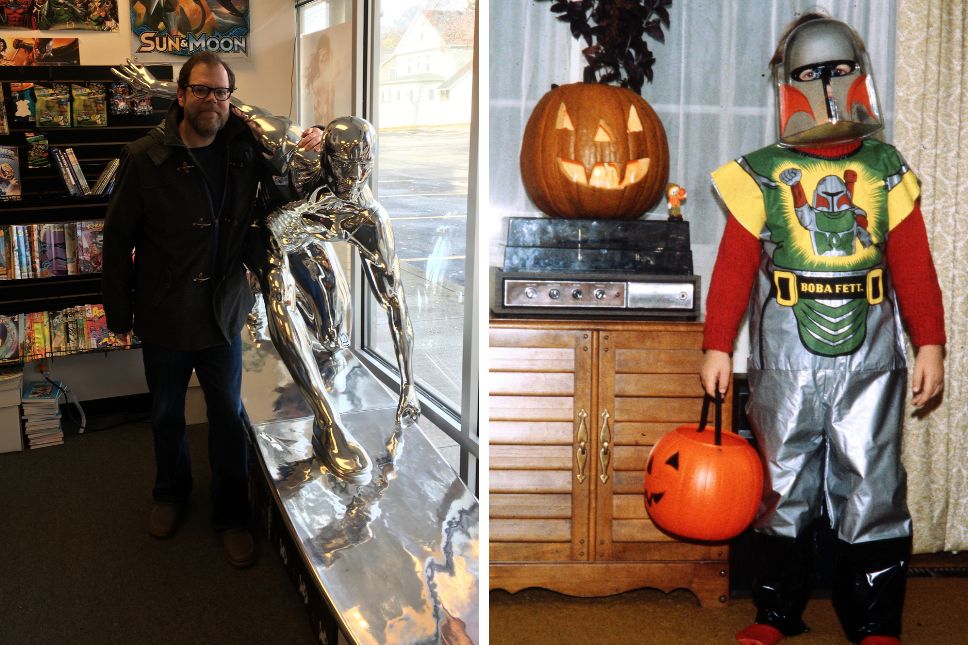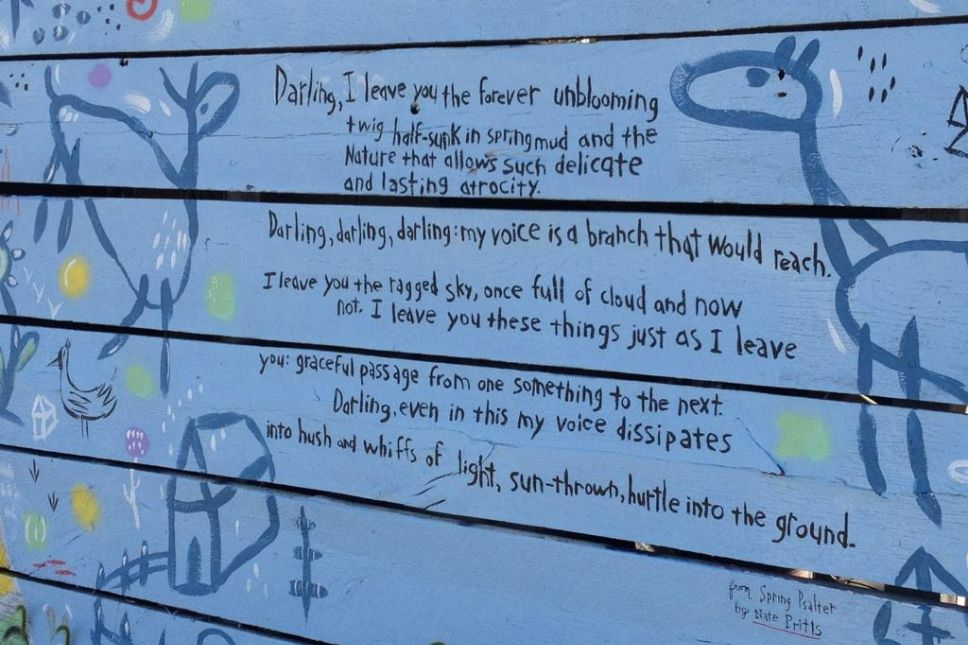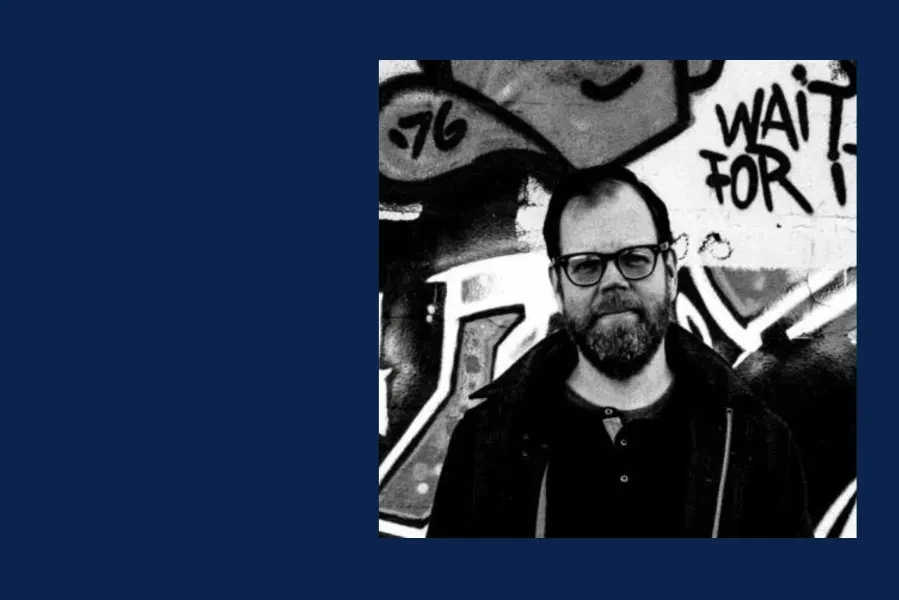Dr. Nathan Pritts recalls the moment from his youth when he realized he wanted to be a writer. He was about 11 years old.
“I was sitting in my backyard and reading a book and enjoying it,” he says. “I said, ‘I want to be in a position to do this for someone else. I want to create this experience for other people.’”
Fast forward years later, and Dr. Pritts not only made his dream come true, but he’s still living the dream.
He started his writing career in the creative arts, writing screenplays and achieving what he describes as “minor success.” Ready for a new challenge, he shifted over to writing fiction, non-fiction, and then poetry.
It was poetry that really resonated with Dr. Pritts and his audience. “That was a great way for me to explore language, explore my own personality, my own experiences, and it was a way for me to create what I thought of as experiences with other people,” he recalls. “I could share this story or poem, and they could connect with it in some way.”

Over the years, Dr. Pritts has seen nearly one dozen of his poetry collections published, fulfilling the promise he made to himself while also inspiring his readers and the students he teaches.
Today, as lead faculty and a professor in the University of Arizona Global Campus (UAGC) Academic Engagement Center, he oversees the University’s English courses and teaches ENG 121: English Composition I, ENG 122: English Composition II, and ENG 225: Introduction to Film. When it comes to writing, Dr. Pritts spends the majority of his time on textbooks, and he’s written the textbooks for all three of the aforementioned courses he teaches.
“I find writing textbooks remarkably similar to writing a story,” he says. “I can convey the subject in any descriptive way that I want to; bring the same attributes to bear as I do when writing a poem.
“I’m still trying to be descriptive and clear. I’m still trying to get my point across.”
Dr. Pritts says the written word — when combined with the lessons he teaches in the online classroom — fulfills another of his lifelong ambitions: to connect with people and, by extension, help them achieve their dreams.
“I feel like what I want to do in the classroom is help foster connections between life-changing content and the students and their lives,” he says. “So they can understand how success here will fuel the vision that they have for themselves.”
Getting To Know Dr. Pritts
We recently spoke with Dr. Pritts about his career and experience working in the field of online education. Read on to learn more about this passionate UAGC faculty member.
UAGC: Why did you become a teacher?
Dr. Pritts: I kind of fell into teaching. I was working at a bookstore, and one of my old teachers from high school came in. He asked what I was doing and what my goals were. I knew I wanted to do something with writing; I wanted to connect with people and talk with people. He said, “It sounds like you need to be a teacher,” and I told him why I didn’t like school. He said, “You will know how to keep kids on the right path.” He was the dean at a community college, and he wanted me to come in and teach one class. It was a business training institute. And it really exploded. I loved that I could help to stoke the students’ love or their understanding of topics that I knew were important and life-changing. That charged me up and convinced me to be a teacher. I went back to school, got a master’s, got my PhD. I started doing things to work with students, weekend tutoring, academic summer camps. I taught junior high and high school kids for a couple of years, but there’s something about higher education and trying to connect with people trying to make a better life for themselves and their families.
UAGC: What kind of student were you?
Dr. Pritts: I actually really disliked school for a variety of reasons. I hated going. I felt like it was a waste of my time. Looking back, at least part of the reason I skipped out constantly was because I was bored – not that I was so smart that I understood everything, but that all the rules and lessons made the learning seem harder than it needed to be, and it intimidated me. It felt cryptic. Like it was some kind of code I couldn’t crack. I knew I was smart, but I felt frustrated that I was being forced to learn without really seeing the point of any of it.

Left, Dr. Pritts meets one of his heroes ... a superhero, actually. Right, Dr. Pritts began studying film at an early age.
UAGC: How did you want to change the experience for your students?
Dr. Pritts: When I first started teaching, I wanted to make sure that I could make connections between the concepts we were learning in the classroom and some kind of practical use for the knowledge. Now, I can see clearly that my main goal as a teacher has always been to make everything as clear and accessible as possible. Sometimes we get so bogged down in jargon and rules, it makes us feel defeated – like there’s no way we can master what it takes to succeed. I’ve had my share of bad teachers who seem to want to make difficult concepts seem even harder than they need to be. My role is to try to break things down, to make things clear, to help students realize that they are in control.
UAGC: Why did you decide to continue your education and earn your PhD?
Dr. Pritts: I discussed this topic in a YouTube video I made for the University. Education is about empowerment. You have an opportunity to learn new skills, to really deepen your knowledge base, and to learn about yourself, too. Then, you get to put it all together and make the best version of yourself.
UAGC: In what ways has education changed the most since you began teaching?
Dr. Pritts: When I took all those career inventory and aptitude tests in high school, they could not have predicted the world I would be working in. Teaching online wasn’t even a glimmer of a possible future career, and that’s an important lesson. When you learn, you’re mastering skills, not careers. You’re honing your strengths and gathering knowledge, and while you might direct yourself to one specific job, your potential is much broader than that. So, while I’m at UAGC doing a job that didn’t even exist when I started my career path, it reminds me that we need to constantly be working to improve and expand our skills, and constantly take stock to see if we are doing all we can, or what we want to, with the skills we have.
UAGC: What’s the key to success at an online university?
Dr. Pritts: One thing that people might overlook is the importance of time management. You’re in a situation where you can call your own shots when it comes to working on your assignments, but until you make that extra commitment to a schedule, until you figure out time management, other things will suffer.
I think it’s also really important to make connections. Making connections with the peers in your class, making connections with your teachers, those things can really motivate you when you’re feeling a little less connected. I feel like that support — understanding that you’re not alone in these tasks and trials – that’s a really important connection to make. I think it’s really valuable.
UAGC: What’s something your students don’t know about you but would find interesting?
Dr. Pritts: I love to bake. It’s a fun and creative process – figuring out what you want to make, and how to make it, then actually doing it – and you end up with something hopefully delicious when it’s out of the oven.
UAGC: Can you tell us a bit about your work life before teaching?
Dr. Pritts: I used to manage a record store, and I was the assistant manager of a bookstore. Though I teach writing and film, I also worked as a corporate trainer for Fortune 500 companies and was a director at an advertising/marketing agency.

Excerpts from some of Dr. Nate's poetry painted on barns as part of a national art project.
UAGC: What is your favorite hobby?
Dr. Pritts: I worked at a comic book store. In fact, I have over 30,000 comic books – been collecting seriously since I was eight or nine.
UAGC: What is the last great book you read?
Dr. Pritts: Probably my favorite book is “Fahrenheit 451,” and I think the reason why is because it talks about the importance of the written word and the importance of ideas, and it puts it all in the context of near-future science fiction. I really connected to this idea that books could mean so much to people.
UAGC: What is your favorite place to relax?
Dr. Pritts: My favorite place to relax is outdoors. I want to be on the trail, amongst trees, on a mountain, near water, taking walks with my dog Juniper. It doesn’t matter. I really just love being outside.
UAGC: What is your favorite sport?
Dr. Pritts: I love hockey and have been a Boston Bruins fan since I was about six.
--
